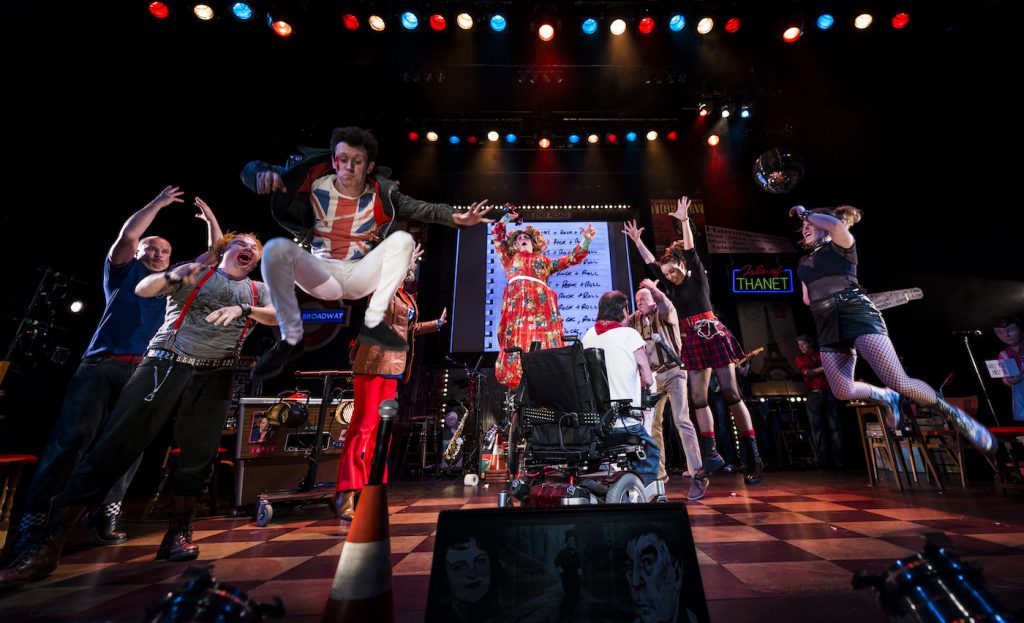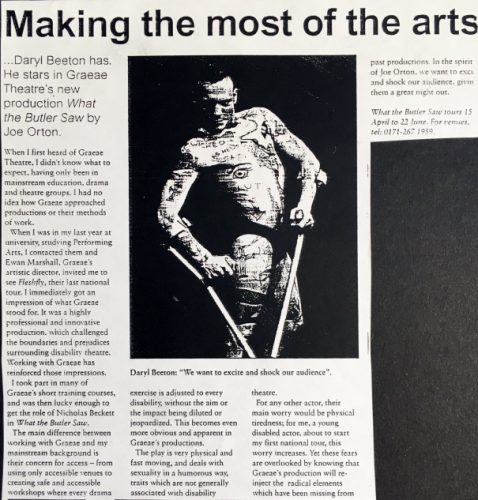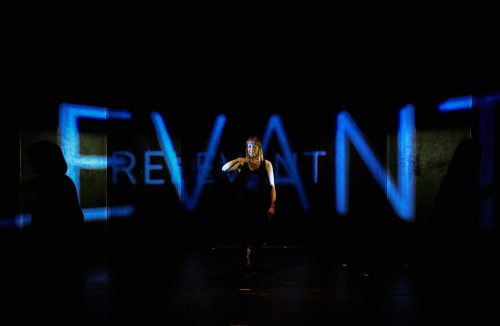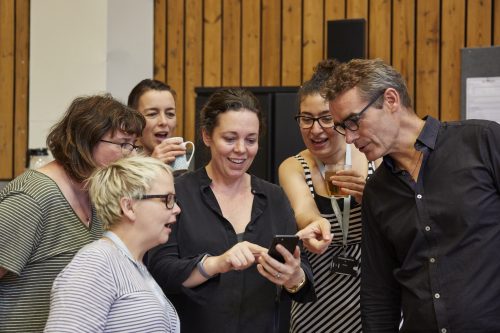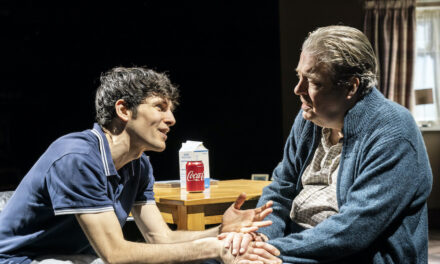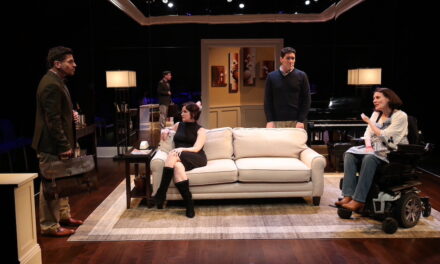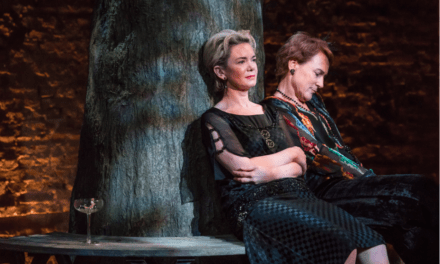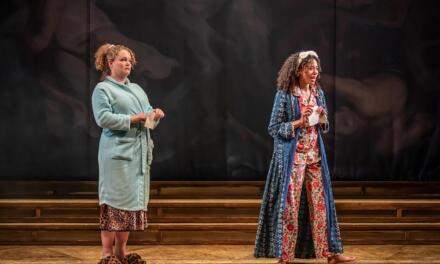To mark the launch of Graeae’s new book, Reasons to Be Graeae, which charts the history of the company which was founded in the early 1980s, Natasha Sutton Williams talked to four Graeae directors whose work has spanned the decades. They give four major insights into what makes Graeae so unique and daring as a theatre company.
Pioneering disabled-led Graeae Theatre Company has come a long way in 38 years. From their first devised production of Sideshow in 1980; to their national tour of A Kind Of Immigrant in 1992; to their rendition of the Vagina Monologues in 2013 with thirty D/deaf and disabled women with eleven women sign language interpreters and audio describers; to the highly successful remount of Reasons To Be Cheerful in 2017. Graeae’s history illuminates the importance of placing D/deaf and disabled actors center stage. Through the years, the Graeae family of artists have created political and theatrically bold work, challenging preconceptions and consistently pushing the boundaries of what can be said and done on stage. Their new biography, Reasons To Be Graeae, is embroidered with memories and is an uplifting manifesto for the future of disabled-led theatre.
Jenny Sealey: Utilizing the Individuality of Disabled Artists
Jenny Sealey has been Artistic Director and CEO of Graeae since 1997. However, she started as a trainee director at Interplay Theatre in Leeds when she was seven-and-half months pregnant. Sealey has pioneered a new theatrical language in the multitude of Graeae productions she has directed. Now, with an MBE and a Human Rights Award for the Arts under her belt, she has spearheaded the writing of Reasons To Be Graeae, interviewing the myriad artists who have been nurtured under Graeae’s wing.Sideshow, A Kind of Immigrant, Vagina Monologues, Reasons to be Cheerful, Jenny Sealey, Interplay Theatre
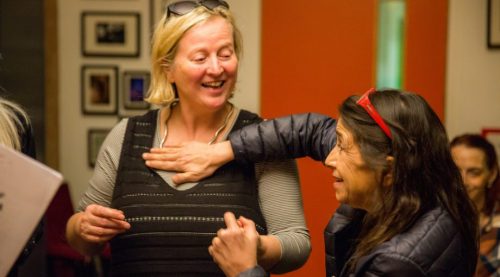
Jenny Sealey with Kathryn Hunter |Photo Credits Disability Arts Online
Throughout the book, Sealey discusses her own thoughts on theatre direction and how to utilize the individuality of disabled artists.
“Call it an ego or a control issue but, as a Deaf director, I have a certain sensibility. I see things in my mind’s eye but I like to play first to see if my instinct is right or not. Co-directing with someone is always harder because you have different styles, two egos rubbing along together, two people telling the actors different things. You learn a lot about yourself and what an egotistical bugger you are! But also, I worry about conforming to the norm and not being able to utilize all those things that are so intrinsic to being D/deaf and disabled.
My experience with our group of actors is so rich and they offer such tricks and quirks which are authentically theirs. For example, in rehearsals for The Threepenny Opera, Max Runham would take off his arm and use it to scratch his back. How could I not have that in the show? It was Brecht after all. Or in 2012, when all the circus performers came down off their apparatus, saying, ‘Jen, pass my leg. No not that one, the one over there.’”
Daryl Beeton: the Confidence of Baring the Body
Daryl Beeton has worked with Graeae as an actor and director since the ‘90s. He was fresh out of studying performing arts at university, moved to London and within a year was cast in a Graeae show. He never thought at the time he would still have such a strong connection with the company 21 years later.
“We need to rewind back to 1997. I was twenty-two. It was a few years after seeing the semi-naked men on Graeae flyers when I was cast in What The Butler Saw. This time though, I was the semi-naked guy on the Graeae flyer. I was dressed in the tiniest of black briefs and covered head to-toe in tattoos (a nod to Joe Orton being sent to prison for defacing library books with images of tattooed men). The tattoos took five hours to paint on, one hour to take the photos, and then just ten minutes to wash off. That night I ended up sleeping with the guy who’d spent five hours painting my most intimate body parts. This was the start of my relationship with Graeae that I have always loved and cherished.
What The Butler Saw opened my eyes to a new way of using disability as a playful and creative language of communication, which I continue to grip and hold tight within my work as a director and performer to this day. The show was unapologetic, anarchic, farcical, rude, sexual, and in your face! All of which blurred from on stage to off stage as the tour progressed. Graeae gave me the confidence as a disabled performer to literally cast off my clothes and be proud of my body.”
Newspaper clipping of What The Butler Saw |Photo Credits Disability Arts Online
Beeton has been a performer for many years but whenever he was acting in a show, he thought he would be better directing it. He started directing youth theatre shows, becoming Associate Director at Half Moon Young People’s Theatre. He then became Artistic Director of Kazzum, creating touring, site-specific and outdoor theatre. He regularly directs for Graeae. Beeton feels strongly about gaining equality for disabled artists in theatre.
“We need to see more disabled people having senior roles in ‘mainstream’ arts organizations, so the battle for equality and arts opportunities is not just a battle from the bottom upwards. Everyone working in the arts, disabled and non-disabled, has the ability to improve the experiences of disabled artists, they just don’t know it yet.”
Rachel Bagshaw: Integrating Access in Theatre
Rachel Bagshaw began her training as a director at Mountview Academy of Theatre Arts. After graduating, her peers started directing in fringe venues but this wasn’t an option for her because of physical access. She took a more circuitous route and worked in arts marketing and education. She started working for Graeae, ran the Training and Learning Department, and through this process started directing shows for the company. Her hard work earned her a residency as Assistant Director at the Young Vic, which supported her to move into full-time directing. As well as being a freelance director, she is currently an Associate for the RADA project Access to Acting, which is designed to increase opportunities in actor training for disabled young people.
“I’ve taken the core Graeae principles into my own work. My recent show, The Shape Of The Pain, used captioning and audio description. With the skills I learnt from Jenny as the bedrock, the creative team and I were able to push this into something which became as much a part of the aesthetic as the performer and the design. Audiences didn’t notice the access as tools but rather as integral to the show.”
Rachel Bagshaw’s The Shape Of The Pain |Photo Credits The Other Richard
Bagshaw believes the best way to improve the experience of disabled artists is to integrate representation across the entire theatre industry.
“Not just onstage and in the auditorium, but also backstage, in the office, and front of house. The more disabled artists we see in the industry, the more we will see in the future. Often I’ve had to turn down work in buildings which are accessible to the audience but not to someone working there. There’s a lot of talk about targets or quotas in terms of actors; we need to start thinking about how we can apply this across the board.”
Nickie Miles-Wildin: Dispelling Myths on Disability Arts
Nickie Miles-Wildin started her theatre career as an actor. She loved rehearsals and devising more than the actual shows, and took this as a sign that directing was the way forward. She was an assistant director to Jenny Sealey and Daryl Beeton on various Graeae productions. She recently took the mantle of staff director on the hugely successful Mosquitoes at the National Theatre. Her latest achievement is landing the Resident Assistant Director position at Manchester Royal Exchange Theatre.
In the book, Miles-Wildin discusses the importance of Graeae as an antidote to mainstream conceptions of disabled art.
“Graeae is family. It’s support. It’s people who get it and make work happen. And with that come challenges; you meet actors, writers, and other directors who do not understand the importance of creative access. I was the assistant director to Jenny in 2015 on Blood Wedding, a Graeae co-production with Dundee Repertory Theatre and Derby Theatre. Here, we met resistance from some of the actors regarding the integration of sign language, live audio description, captions, and even their views of D/deaf and disabled actors.
We were faced with the attitude that, as theatre-makers, our work is not as high quality as our non-disabled peers and with this comes a lack of respect for what we are creating. Diplomacy is the key, but we should never make our work feel of lesser value. It is extremely valuable to evoke change in theatre and indeed the world in which we live.”
Nickie Miles-Wildin (front left) in rehearsals for Mosquitoes at Royal National Theatre |Photo Credits Brinkhoff/Mogenburg
Through the insights, anecdotes, and interviews of this inspiring biography on Graeae’s monumental history, a vital lesson jumps off the page: for equality to occur, disabled and non-disabled artists must challenge mainstream theatre preconceptions, prejudices, and biases. For 38 years Graeae has pushed against the odds to get its voice heard, and they are only just getting started.
Reasons To Be Graeae: A Work In Progress, published by Oberon Books, can be purchased here.
This review was originally commissioned by Disability Arts Online. Reposted with permission. Read the original article.
This post was written by the author in their personal capacity.The opinions expressed in this article are the author’s own and do not reflect the view of The Theatre Times, their staff or collaborators.
This post was written by Natasha Sutton Williams.
The views expressed here belong to the author and do not necessarily reflect our views and opinions.

